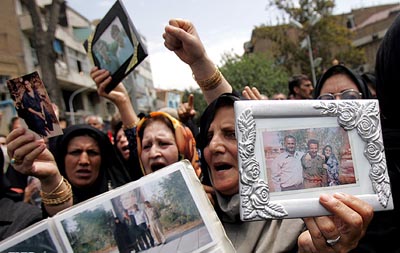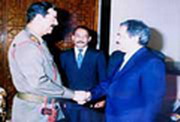A small classified advertisement placed in the Hamshahri newspaper, which is affiliated to Tehran’s City Hall, in June 2007 might not initially have seemed like a big deal, but it turned out to be intriguing.
It was addressed to a young woman called Maryam and wished her the best of luck with her return, alongside a picture of her wearing a veil.
At first glance, this was nothing out of the ordinary. Most people would not have recognised her, but some of the newspaper’s readers – those who were alive 30 years ago – knew who she was.
It was the same picture that Maryam Rajavi had used while campaigning in the first parliamentary elections after the 1979 Islamic revolution.
The ad was an attempt by the People’s Mujahedin of Iran, MKO, to revive – and rehabilitate – its name in the minds of the Iranian people after a long absence from public view.
Seven years ago, during the presidency of Mohamad Khatami, the European Union added the MKO to its list of terrorist groups. In June 2003, French police arrested Rajavi and some of her followers and Iranian television broadcast images of her in handcuffs.
For many young Iranians, this was the first time they had laid eyes on the disgraced opposition leaders.
However, on January 26 at a meeting in Brussels, the 27 EU member states decided to remove the MKO from its list, a decision that angered the Islamic Republic’s leaders.
Mohsen Torkaman, a 21-year-old student at Azad University, was also dismayed, "The Europeans showed that they use terrorism as an instrument. What matters to them is to confront countries that pose a threat to them. They do not care that a group like MKO carried out many terrorist operations in the 1980s in Iran and killed civilians."
The MKO was officially founded in 1966 after the Shah cracked down on Ayatollah Khomeini and his followers. Its goal was to overthrow the Pahlavi regime and establish an Islamic government, a mission that was supported by other Islamist militants close to Khomeini.

July 2008
Massoud Rajavi –at the time a high-ranking MKO leader who later became Maryam Rajavi’s husband– was a victim of the Shah’s violent repression. He was arrested in 1971, along with 12 other MKO members, but was released after the revolution. He was the only one to survive – the rest had been executed.
After the downfall of the Shah, the MKO quarrelled with the clerical leadership of the revolution, both over ideology and how to run the country.
For example, Akbar Hashemi Rafsanjani, an influential revolutionary cleric, told the Keyhan newspaper in July 1980, "The MKO was based on Islam and Shi’ism in the beginning, but the MKO did not reach out to scholars and experts on Islamic studies nor did Islamic scholars pay any attention to them. Inevitably, the MKO fell into the hands of opportunists and immature people."
Some MKO members were the children of leading clerics, but found they could not accept the "Guardianship of the Islamic Jurists" – under which the work of government is overseen and guided by expert practitioners of Shia law. The late Ayatollah Taleghani, one of the two most important revolutionary leaders, Ayatollah Ali Janti, the head of Guardian Council, and Ayatollah Mohamadi Gilani, then attorney general, are among the best-known clerics whose offspring joined the MKO.
Although the MKO rejected the constitution that was approved by a referendum a few months after the revolution, Massoud Rajavi tried to run in the first parliamentary elections. However, he was disqualified because of his opposition to the constitution.
On June 18, 1981, after these disagreements had intensified, the MKO publicly announced it was going into opposition. Later that month, the offices of the Islamic Republic Party were bombed, killing more than 70 people. Many in Iran suspected this was the work of the MKO.
The MKO’s leaders then withdrew from politics altogether, left for Iraq and took up armed resistance. They were not alone; Saddam Hussein had already been waging war on Iran for a year.
This was seen as a betrayal of Iran and public opinion hardened against the MKO. But Reza, an MKO member who now has political asylum in Germany, says the leaders of the Islamic Republic gave them no choice, "Their exclusivist approach didn’t leave any room for the political participation of other groups."
After Iran accepted UN resolution 598 in June 1988 urging Iran and Iraq to accept a ceasefire, the MKO launched a military attack against Iran across the Iraqi border.
"This operation was our last chance, based on the MKO’s idea that we would either kill and win or die," said Hadi Shabani, a former member of the MKO who has since returned to Iran, according to Fars News Agency.
The MKO advanced into Kermanshah, a city in the west of Iran, but the Iranian army counter-attacked, and the MKO fighters were either killed or withdrew.
After this operation, it is claimed that many political prisoners affiliated to the MKO were executed in the summer of 1988. Ayatollah Hussein Ali Montazeri, Khomeini’s deputy, confirmed this in his memoirs, although there are no official statistics.
Now, after many years, the removal of the MKO from the EU’s list of terrorist groups is seen as a big victory for Maryam Rajavi and her followers throughout the world who are trying to keep their name alive in Iran.
But Reza, who kissed his political activities goodbye many years ago and now earns his living driving a cab, doesn’t think his former comrades stand a chance of coming to power any time soon.

"The hardest job for the MKO’s leaders is to explain to the Iranian people why they stood alongside Saddam Hussein. Many people don’t understand the MKO’s situation," he said.
So although the EU may have enhanced the MKO’s international reputation, winning over Iranians might prove an impossible task.
Sara Shams is the pseudonym of a journalist in Tehran
About Mianeh: Mianeh is a new independent web-based initiative run as a project by the Institute for War & Peace Reporting (iwpr.net) the award-winning non-profit media development organization that works across the globe to platform local voices and promote international learning and engagement. Mianeh aims to be an open space for ideas, news and debate where writers in Iran can reach out to each other as well as to those outside the country who are interested in learning more about the vibrant and dynamic society that is Iran today.
Payvand News – 03/02/09
By Sara Shams, Tehran (Source: Mianeh)

